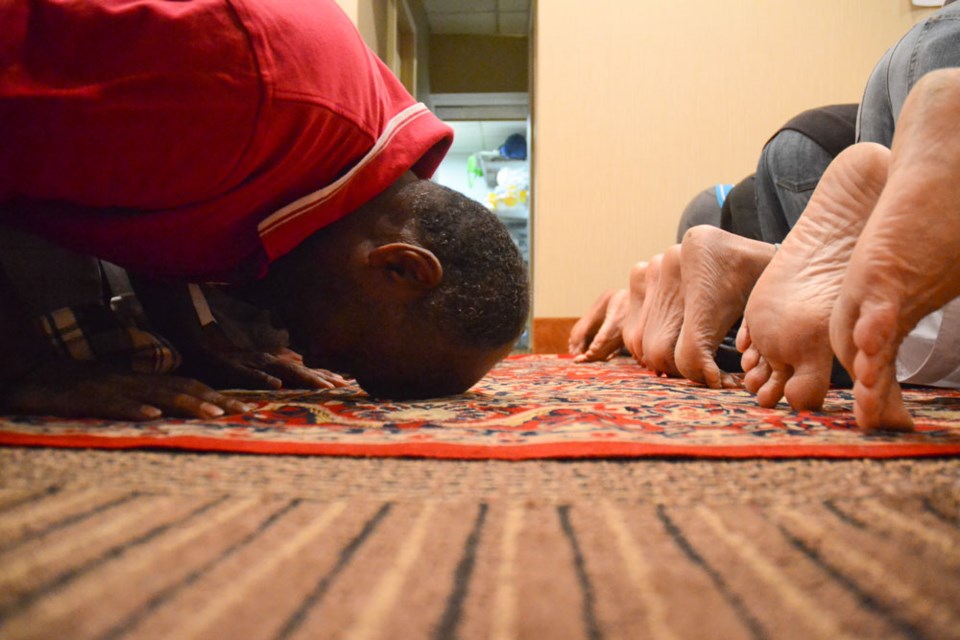By Alex Coop
[email protected]
Ramadan, the ninth month of the Islamic calendar may fall on a different day, often a different month each year, however its meaning has remained strongly intact for generations: Appreciation.
"It's a small room, but we have a big space in our hearts," says Mohammad Waseem, early candidate for the vacant Estevan council seat and owner of the Fas Gas station in the city, who in 2009, helped spearhead the now rapidly growing Muslim community in the city. He enters into a compact white-walled room at the back of the Islamic Centre in Estevan around 9 o'clock in the evening on July 14, where a sheet covered in food takes up most of the space on the floor. The place is bustling for the first few minutes, as several people, some regulars, some entering the centre for the first time, walk in and find themselves a place to sit next to a plate. A date sits in the middle of each one, alongside a bit of bread.
Dates were believed to be the first pieces of food the prophet Muhammad broke fast with, and are one of the more obvious signs of Iftar, the buffet-style gatherings that take place during Ramadan. Observed as one of the five pillars of Islam, which is best described as the basic foundations for Muslim life, Muslims worldwide fast for 29 to 30 days during Ramadan. Visual sightings of the crescent moon dictate whether fasting lasts 29 or 30 days, meaning those taking part are not allowed to eat food or drink between dawn and sunset, and must restrain from sinful behaviour. It's a time of spiritual reflection, and helps Muslims empathize with those who are less fortunate.
"It's an essential part of our religion," says Waseem. "You start to understand what it feels like to be hungry all the time, and you learn to appreciate things so much more."
Hadie Rashed, Waseem's 10-year-old son isn't required to fast, but decided to participate nevertheless. Once Hadie turns 14, he will have to fast every year. Fasting now will help him become more prepared for future fastings, especially during the months where Ramadan takes place during school, his father explains. He added it will also instill certain personality traits like patience, respect and appreciation at an early age.
Ramadan teaches you all these things, and gives us a chance to thank God for everything he has given us," he says.
Both newcomers and old friends chat excitedly while sharing the food brought to the feast. Many of them are doctors, marketers, or engineers. They talk about Iftars in Regina, where expectedly, the Muslim community is much larger.
Travelling from Regina, Mahmoud Omer fits into this category.
"I was trying to find a place to get together with some of my brothers," he says, adding more people outside of the Muslim community participate in Ramadan-related festivities.
As the night goes on, the conversation slowly shifts to the concept of charity, a monumental part of Ramadan and the people of Islam in general. Everyone who is able to do so is obligated to participate in zakat, a practice that is meant to ease economic adversity for Muslims throughout the community by means of donating a portion of one's wealth.
"Minus our homes and our vehicles, all the wealth we accumulate over the past year, in the shape of bonds, business or gold, nearly anything that equals to some form of wealth, is calculated, and 2.5 per cent of it all is given to the poor," explains Waseem.
Muslims who aren't deemed wealthy can participate in sadaqah, a voluntary charity that asks each member of the family to donate 11 dollars.
Iftar wraps up, and the dozen or so people gathered at the Islamic Centre relocate to the central room of the building, an open space with the religious text of Islam, known as the Quran, sitting at the front. Rows of people quickly form, and the recitation of the Quran begins, led by the centre's prayer leader Hafiz Zafar. Uniformed prayers are said, mixed in with the occasional personal messages to God. By the end of Ramadan, an entire section is recited, but tonight's recitation ends after 10 minutes.
"He knows all 30 chapters of the Quran by heart," says Waseem after the prayers, noting Zafar's incredible commitment to the holy book.
The commitment to the Muslim community shines brightly in Estevan, proven by the fact that the small gatherings that took place in the home's of Waseem and Butt have now evolved into much larger get togethers at the Islamic Centre, which has been the their gathering spot since last year.
"We need to find something bigger, the Muslim community is growing fast," says Waseem, suggesting that by 2020, the number of Muslims in Estevan will increase from its current number of about 70, to 200. He says he's spoken to the mayor about looking for alternate possibilities.
"We've been changing locations every year since 2010, we would like something permanent," says Waseem.
The dedication to the Muslim community is strong and their facility in Estevan may be small, but everyone at the centre frequently encouraged anyone of any religion to come out and share the experience with them. As the Islamic Centre slowly empties, Waseem emphasizes this point.
"We will never turn anyone down, our message is about love, tolerance and patience."




